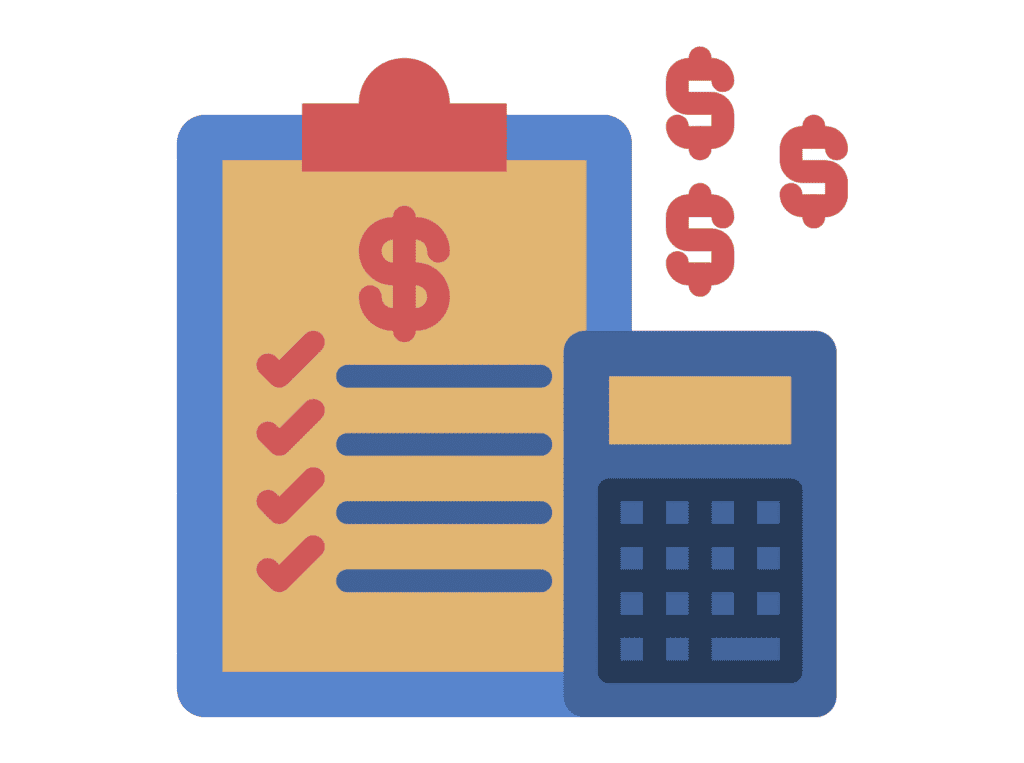Stressed to the gills about cash and wanting to know how to stop obsessing over money?
Here we’ll show you 6 simple ways to help you lower that anxiety over money.
We’ll go over which budgeting apps help you manage money the best, how many times you should be checking your bank account, and how to appreciate what’s actually important in life.
Check out the helpful blog below. 😊
How Can I Stop Being Obsessed With Money? (6 Simple Steps)

1. Get A Budget

Having 100% accountability for your funds is the first step in overcoming your obsession with money. A budget will help you organize personal finances, give you a clear picture of where your money is going, and help you curb your spending in unnecessary areas.
Many free budgeting apps available, such as Personal Capital, can create a tailored money management plan for you. In addition to giving you an overview of your spending, Personal Capital offers free financial advice from professionals.
You can stop obsessing over money by taking control of your finances and making a budget. With a clear plan in place, you avoid saving too much and not enjoying life because you will know that you are on track to achieving your financial goals.
(And here’s more info on how to create a family budget if you need more help. 😊)
2. Check Your Bank Account Less Frequently
The next thing you have to do is stop looking at your bank accounts so much! If you want to break the habit of being obsessed with money, you have to give yourself a break from constantly checking your balance and seeing how much money you have.
That doesn’t mean you should never check your bank account. On the contrary, you still need to keep track of your finances and ensure everything is going smoothly. But checking your balance every day will add to your anxiety.
Instead, try checking your account once a week or even once a month. This will help you relax and give you a better perspective on your finances. You’ll still be able to see if there are any problems, but you won’t be as stressed about it.
3. Stop Trying To Keep Up With The Joneses
Comparing yourself to others can give you constant money headaches and make it feel like you’re never good enough. You have to stop trying to keep up with the Joneses if you want to break the cycle.
It’s human nature to compare ourselves to someone else, but comparisons can be toxic when it comes to money. Constantly comparing your financial situation to other people’s can lead to envy, resentment, and feelings of inadequacy. And when you’re trying to keep up with people who have more money than you, it can be a never-ending and fruitless race.
There are a few things you can do to break the cycle of comparing yourself to others and their money.
First, remember that everyone’s financial situation is different. Just because someone seems to have a bunch of money doesn’t mean they actually do. People are good at hiding their financial problems, so don’t assume that they’re doing better than you because someone has a nice car or a big house.
Second, focus on your own financial and investors’ goals. Rather than worrying about what other folks are doing with their money, focus on what you want to do with yours. What are your short-term and long-term financial goals? How can you get closer to achieving them?
Finally, be grateful for what you have. Learn how to enjoy life without money (or when you master that, maybe even live without money). It’s easy to focus on what we don’t have, but when we take the time to appreciate what we do have, it can help put things in perspective. So instead of fixating on the fact that you can’t afford that new car or designer handbag, be grateful for the roof over your head, the food on your table, and the clothes on your back.
When you stop comparing yourself to someone else and their money, you’ll be able to focus on what’s important to you and achieve your own financial goals.
4. Practice Gratefulness

It can be challenging to stop obsessing over money, but practicing gratefulness is one way to help break the cycle. Be thankful for what you got, and try to focus on the positive aspects of your life. This doesn’t mean that you should ignore your financial problems, but rather try to see them in a more objective light.
In addition to practicing gratefulness, it’s also essential to be content with what you have. This doesn’t mean that you should just settle for less than you deserve, but rather appreciate the good things in your life. Instead of constantly chasing after more money, focus on enjoying the things you already have.
It’s important to remember that money isn’t everything. Yes, it’s essential to be financially secure, but that doesn’t mean that you should obsess over every penny or have shopping guilt for every purchase. Instead, if you can learn to be grateful for what you have and be content with what you have, you’ll be much happier –and your financial worries will start to fade into the background.
5. Give Yourself Permission to Spend Money

It’s okay to spend a little money. In fact, it can actually be healthy for you. If you’re constantly thinking about money and stressing over it, you’re not going to be able to enjoy your life. So instead, give yourself permission to spend a little bit of money on things that make you happy.
For example, instead of always eating out at cheap fast food places, treat yourself to a nice meal at a restaurant once in a while. Or, instead of always buying the cheapest clothes, allow yourself to buy a few nicer items that you really love.
It’s all about balance. Of course, you don’t have to go crazy and spend all your money on unnecessary things, but giving yourself permission to spend a little bit of money can help reduce stress and make life more enjoyable.
So go ahead, give yourself permission to spend a little money. You deserve it!
6. Create Memories With Loved Ones

If you’re finding that you’re obsessing over your money and not enjoying life, it’s time to focus on creating memories with loved ones. This can be done in several ways, such as taking a trip together, going out to eat at a nice restaurant, or simply spending quality time together doing something you both enjoy.
There are many benefits to creating memories with loved ones, including reducing stress, improving relationships, and making lasting bonds. Of course, you will enjoy your time together more, but you’ll also find yourself obsessing less over your money. So go ahead and plan that trip, make a reservation at that restaurant, and enjoy your time with the people you care about most.
Making memories with those you love is a great way to break out of the cycle of worrying about money and instead focus on what’s truly important in life. So next time you’re feeling stressed about your finances, take some time to plan a special memory-making activity with your loved ones. 😊
FAQ
What is an obsession with money called?
An obsession with money is often called greed or avarice. Greed is an intense and selfish desire for wealth or possessions. Avarice is similar to greed, but it also includes hoarding money and possessions. Someone obsessed with cash may be driven by a need for power or control, a fear of poverty, or a desire for material possessions. While an obsession with money is not necessarily a bad thing, it can become problematic if it leads to unethical or illegal behavior.
What makes someone obsessed with money?
Some people are just naturally obsessed with money. They’re always thinking about making more money and how to save money. They’re always looking for ways to earn more money and spend less money. For these people, money is always on their minds.
Why do I obsess over purchases?
There can be a few reasons why you might obsess over purchases. Maybe you’re worried about making the wrong decision and regretting it later. Or, you could be anxious about spending money and not having enough left over for other things. It’s also possible that you simply enjoy researching and debating different products.
Is it normal to be obsessed with money?
It’s perfectly normal to want to be financially secure and to have a healthy relationship with money. However, if you’re constantly thinking about money and struggling to control your spending, it may be time to seek help. There are many resources available to assist you in managing your finances and developing healthy financial habits. So, if you’re concerned about your relationship with money, please reach out for help.
What is money anxiety?
Money anxiety is the stress or worry that comes from thinking about money or saving too much money. It can be caused by several things, including financial insecurity, unexpected bills, or the fear of not being able to make ends meet. Money anxiety can lead to negative consequences, including financial difficulties, relationship problems, and mental health issues.
Summary
It’s time to end the obsession with money. You can start by implementing some of the tips we shared today. Just remember, it takes time and practice to change your mindset. But once you do, you’ll be able to live a lower-stress life without constantly worrying about how much money you have (or don’t have). So what are you waiting for? Start practicing gratefulness, budgeting, and checking your bank account less frequently – and watch your stress levels decline!
Hello! I'm Charles. 1st gen millionaire, real estate investor, health enthusiast, and military veteran. In the last 17 years, I have managed billions of dollars of resources for the Department of Defense. Created financial management plans that enabled fellow service members to get out of thousands of dollars in debt and tailored wellness plans that helped people reverse and eliminate high-blood pressure, pre-diabetes, and obesity. Learn more about me here.